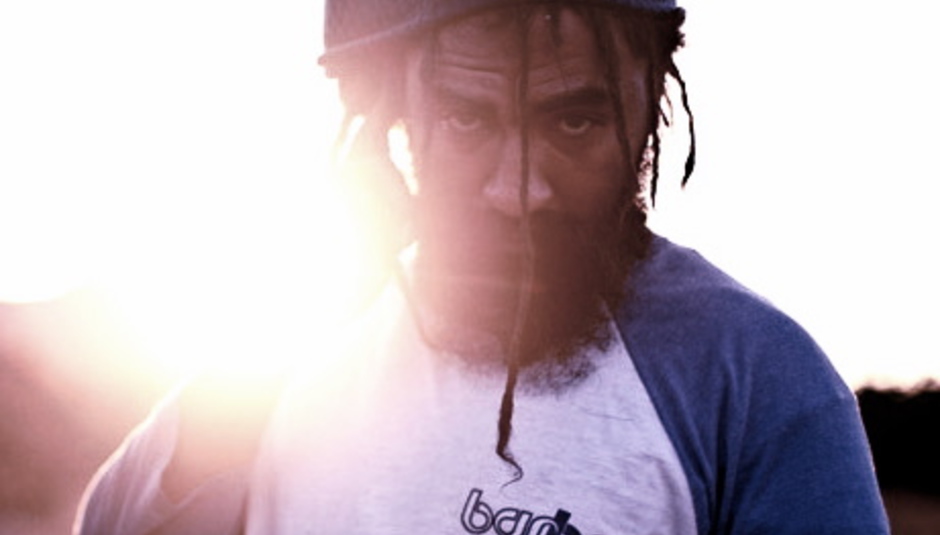On a crackling, indistinct line from London – what could be more appropriate, really? - Sumach Ecks is explaining the reasoning behind his music’s raw, firey nature. 'That’s just the honesty of life, man. Unfiltered, not overproduced, very in your face and personal, just attacking the canvas and taming the wild horse. That’s how I wanted it, I wanted you to feel my voice and hear the blood in my throat. I didn’t want it to be too gentle, I wanted it to be abrasive, I wanted people to have to adjust the treble and the bass, and change some shit up, y’know? It’s just being honest man, not candy coating shit. That’s the best way. The artists I listen to are the most truthful, the ones that make me shed a tear or want to ball up, clench my fists and knock some police out. That brutal honesty - it’s painful, but it heals at the same time, you know?'
That talk of brutal honesty and human physicality is as fine a snapshot of his debut album as Gonjasufi, A Sufi And A Killer, as anyone could ask for. Since its release in March on Warp, it has gradually established itself as one of the year’s oddest but most compelling records, all sharp edges and jarring angles, pencil sketches that blossom into sepia-tinted portraits, fragments of opposing character that lurch into view through a sandstorm of dusty samples and homely sentiment. Upon issue it proved initially tough to fully absorb or understand, but over the last few months the curtain of haze has lifted. What has emerged is a set of songs that scorch like the desert’s dry heat, as likely to espouse joy and comfort as fear and anger.
If the sheer force of his vision occasionally crosses a line into the harsher realms of the human psyche, on the phone Ecks comes across as closely attuned to the more contemplative side of his music. He still epitomises the traits that litter A Sufi And A Killer: he’s erudite, overly passionate, and chooses his words with a lopsided eloquence that could almost suggest he knew the question before he was even asked it. But there’s also an easy warmth there, as he peppers sentences with regular 'y’know's, and the occasional 'and shit', and hangs back in amused silence when I lose track of what I’m trying to say and spend a couple of minutes mumbling incoherently about his music’s spiritual nature.
Despite its collaborative gestation – the backing tracks for each song were put together by members of Los Angeles’ hip-hop underground – A Sufi And A Killer is bound together by a tight sense of purpose and focus, sounding remarkably like the product of a real collective vision. Was it a case of sending ideas back and forth, before putting together a final product? 'Nah, the music was given to me first, by Mainframe, Flying Lotus and Willie [Bensussen, more commonly known as LA firebrand The Gaslamp Killer], and I just laced it with whatever it called for, whatever colour paint it needed. I just attacked the canvas, y’know.'
He thinks for a moment when I ask whether there was a common aim all four shared in its creation. 'Definitely, we were all seeking to achieve this sound, and everyone plays their part. The sound I have when I do my own stuff by myself is different than when I do stuff with Mainframe or FlyLo. There’s still a consistency in there, but it’s different.' How so? 'Well… Let’s say the stuff I do with other people pulls something else out of me. Because it’s their interpretation of something, I’m putting it in a different environment already and I have to adjust to it. Intimacy’s the one thing that’s very consistent, I’ll bring that to whoever I work with, but if somebody brings me a different shade of green then I’ll react to it, y’know?'
Video: Gonjasufi: 'DedNd'
The underground hip-hop community in Los Angeles is in a remarkable state of creative and conceptual health at the moment. Spearheaded internationally by Flying Lotus’ chaotic, jazz-infused workouts, the Brainfeeder collective – FlyLo, along with the likes of The Gaslamp Killer, Daedelus and Nosaj Thing, amongst many others – reimagine the city’s shifting identities as wildly different beasts. It’s a heady cocktail, chewing up and spitting out elements of electronica, hip-hop, jazz and soul, all bound together with oceans of sub-bass that have seen the collective discover shared ground with London’s dubstep practitioners. Ecks has been involved with the LA underground for quite some time, having first emerged to wider attention with his cracked, monastic vocal turn on Flying Lotus’ ‘Testament’.
'As far as this new scene of beatmakers is concerned, Gaslamp Killer is kind of the thread from me to LA right now, y’know, he introduced me to a lot of the cats there, then it spiraled. He’d vouch for me and tell me who I should work with – he’d say, “You should work with Computer Jay, or Ras G, or Samiyam, or FlyLo”. He’s been the catalyst of communication between us.'
And how did the hookup with Lotus for ‘Testament’ happen? 'Mainframe was sending me some beats from him, because [FlyLo] would be sending out these beat tapes. I actually recorded ‘Ancestors’ before ‘Testament’ – way before – and we did a couple of songs other than those two. When it came to his album he asked which song I wanted, and I said I wanted to keep ‘Ancestors’ for my record, so he took ‘Testament’. We’ve been friends ever since, y’know.'
Is that musical dialogue still happening? 'It’s still ongoing, but he’s busy. He’s going in a different direction with his sound. I think the best way to work with him now is to send him an a capella and see what he can do with it. ‘Cos the beats I picked, like ‘Ancestors’, [they’re] straightforward boom-bap shit. I do know he’s been making some boom-bap shit again, and I’ll try to get hold of one of those beat tapes so I can hear it and make some shit up.'
When asked whether there was anything in particular that drew him to that community – especially when putting together his album – he launches into a labyrinthine metaphor which neatly captures the conflicted essence of A Sufi And A Killer. 'It was just the freshness of creativity man.' He thinks for a second, before continuing. 'FlyLo’s sound really reminds me of ice, some polar or arctic shit. It’s like I was in the desert, looking for water, and this motherfucker’s brought ice for me - that’s the relationship we had. When I see his sound it’s a purple or indigo colour. Gaslamp knew I was fiending for water, but he would come through with a glassful of sand and tell me it was water. Then I’d drink it and my throat would get even more fucked up! It still quenched my thirst, but it fucked my throat up more. And then [for the album] he came through with a glassful of sand with some ice cubes on it – and that was Flying Lotus and him together. The extremes of their personalities were in their sound, but [there was] a cohesiveness, a friendship that was there that attracted me to both, you know.'
It’s a pretty accurate way of describing the difference between the two’s production style, I say, Gaslamp Killer’s intensely physical practice of crushing samples together versus Lotus’ more meditative, psychedelic approach. 'Yeah man, FlyLo’s a mellow dude. Gaslamp’s a fucking tornado, he’s some fucking tsunami shit! FlyLo’s like the eye of the storm, as cool as a motherfucker. When it’s me and Willie though, we’re at the stage where he’s creating tsunamis and I’m just surfing on them, y’know?'
Video: Gonjasufi: 'Kobwebz'
In previous interviews Ecks has spoken at length about the importance of yoga to his life. When I ask whether the headspace he accesses through meditation is a similar one to that of music, he fires up. 'Yes. It’s one and the same man! The feeling I have when I’m actually recording a song, and it’s coming out the way I visualized it, is one of the best feelings I’ve ever felt in the world. It’s very addictive, and the levels of pineal gland, serotonin, all that, chemicals that are being released, I live for that. It makes it worth going through all the shit. It’s a purpose.'
And the need to express that honesty and reality in music, is that something that’s triggered by his environment? 'Yeah, definitely man. Trying to get out of this fucking space in my head. I’m reminded every day when I go to the grocery store and people are afraid, and grab their grocery cart and go down the other aisle. It’s peoples’ arrogance and ignorance.' That’s certainly a fear that’s fed into by the state of the modern media. 'Yeah man, it’s all CNN and Fox, it’s all television man, it’s bullshit. The TV densensitises the human brain and the heart, it nullifies human vibration. People believe anything they see on TV, and I try to tell them - the biggest way to educate yourself is to put stamps in your passport. It’s all biased, you have to experience it yourself, you know? I’m beginning to now, and I’m realizing how suppressed the information and truth is to America. I feel bad for us as Americans because the truth is being neglected and filtered. We’re in a vulnerable state because we’re beautiful people, we have a beautiful land, but this freedom we think we have is false. And it’s at the cost of enslaving others on the other side of the planet. It’s these corporations and shit, the people who are running it all – it’s all bullshit, man.
'You can’t blame the people, they believe the TV, they’re innocent in the sense that their innocence is being manipulated… This generation will rely so much on the internet for information, and they’ll believe that shit. No kids are going to the library anymore, you don’t see them in the library, you see them on the internet. And they’ll believe any shit they see on there. The substance is digital – we have digital kids now. When the power’s taken out of the hole in the wall, then what? What type of world is this? These kids don’t have drumsticks, they aren’t doing yoga, so we’ve got to be careful right now. This generation – my generation – has a responsibility to step in and filter out this computer shit that’s going on.'
A little ironic, perhaps, given that so much of the music Gonjasufi and his contemporaries are making is reliant on computers and electronics. 'It is, and it can become dangerous because you’ve got so many cats using the same programs and the same sounds but who don’t have any experience of life. So a lot of the music doesn’t have any substance or content, it just sounds good.' Does it make him want to begin performing with a band then, to detach from that? 'Yeah man, in October or November, when I get back from touring out here, it’s nothing but band time man. That’s my priority and my focus, putting a band together and getting ready to get back out here again.'
When asked whether he has any plans to perform in the UK in the near future, the answer is a definite yes, hopefully towards the end of the year. He also reveals that a remix album is due in October, featuring the likes of Mark Pritchard and Broadcast, and an EP of earlier material in the first couple of months of next year.
Our conversation has progressed seamlessly from tales of a real, tangible past into both real and imagined futures, and as time winds up we reach further still, to the point where we’ve come full circle. It’s an appropriate way to end a discussion about a record that gains much of its power from an uneasy clash between tradition and technology, a tension between old and new attitudes and ideas. 'No matter what, it’s going to get worse before it gets better. It will get better, but it’s going to get worse first. It’s already in momentum. When that cataclysmic event happens there’s going to be turning point, a shift, and that’s the moment when we’ll have a chance to say “Okay”. So it’s about preparing for that moment when we don’t have electricity, we can’t get on the internet and we don’t know what the fuck’s going on. How am I going to get water? How do I grow food? How do I get electricity?' Fundamental questions, then. 'It’s about education man, through the earth and through nature.'






















